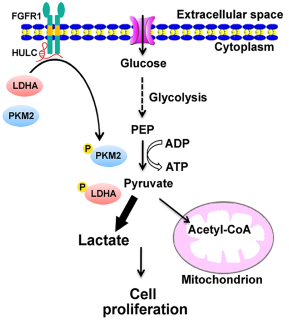Cellular metabolism reprogramming is a major hallmark of cancer. For example, cancer cells preferentially convert glucose to lactate through glycolysis, even in the presence of oxygen, which provides more metabolites for cell proliferation. This aerobic glycolysis process plays important roles in tumorigenesis and tumor progression. Long noncoding RNAs (lncRNAs) are defined as transcripts longer than 200 nt without an evident protein coding function. These molecules play important regulatory roles in many biological processes, and their dysregulation has been observed in many different types of cancer, regulating a diverse set of important cancer hallmarks. Interacting with proteins is a crucial way for long noncoding RNAs (lncRNAs) to exert their biological responses.
Recently, Prof. Ruibing Chen from the School of Pharmaceutical Science and Technology and her collaborators developed a high throughput strategy to characterize lncRNA interacting proteins in vivo by combining tobramycin affinity purification and mass spectrometric analysis (TOBAP-MS). They used this method to investigate the protein interactome of lncRNA highly-upregulated in liver cancer (HULC), a liver cancer specific lncRNA molecule, and identified 140 candidate HULC-binding proteins.

They discovered that lncRNA-HULC could directly bind to two glycolytic enzymes, lactate dehydrogenase A (LDHA) and pyruvate kinase M2 (PKM2). HULC functions as an adaptor molecule that enhances the binding of LDHA and PKM2 to their upstream kinase fibroblast growth factor receptor type 1 (FGFR1), leading to elevated phosphorylation of these two enzymes and consequently promoting glycolysis. LncRNA-HULC promotes liver cancer cell proliferation and tumor growth through regulating aerobic glycolysis.

This study provides a convenient method to study lncRNA interactome in vivo and reveals a unique mechanism by which HULC promotes Warburg effect by orchestrating the enzymatic activities of glycolytic enzymes.
Reference:
Wang C, Li Y, Yan S, Wang H, Shao X, Xiao M, Yang B, Qin G, Kong R, Chen R, Zhang N. Interactome analysis reveals that lncRNA HULC promotes aerobic glycolysis through LDHA and PKM2. Nat Commun. 2020 Jun 22;11(1):3162. doi: 10.1038/s41467-020-16966-3.

